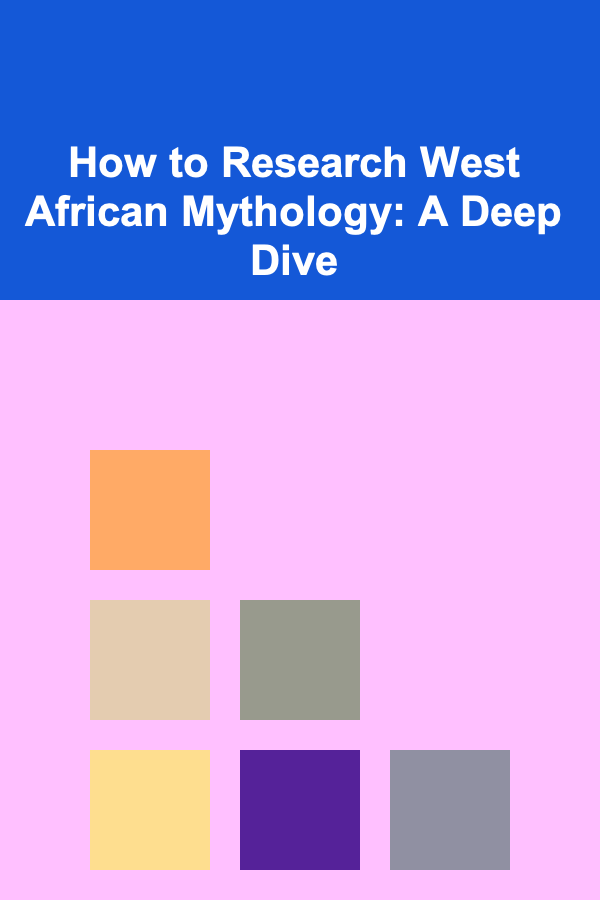
How to Research West African Mythology: A Deep Dive
ebook include PDF & Audio bundle (Micro Guide)
$12.99$8.99
Limited Time Offer! Order within the next:

West African mythology is a rich and diverse tapestry of beliefs, stories, and traditions that have shaped the cultures of the region for centuries. From the pantheons of gods and goddesses to the intricate tales of heroes, tricksters, and spirits, these narratives offer profound insights into the worldview, values, and social structures of West African societies. However, researching this vast and complex subject requires a careful and nuanced approach, acknowledging the historical contexts, methodological challenges, and ethical considerations inherent in studying living traditions and oral histories.
I. Understanding the Scope and Diversity
West Africa encompasses a geographically and culturally diverse region, including countries like Nigeria, Ghana, Senegal, Ivory Coast, Benin, Togo, and many others. Each of these countries, and indeed, the many ethnic groups within them, possesses its own unique mythological traditions. It's crucial to avoid generalizations and to recognize the specific cultural context from which each story and belief originates.
A. Key Mythological Systems: A Brief Overview
While each culture has its own specific deities and narratives, some broader mythological systems are particularly influential and well-documented:
- Yoruba Mythology (Nigeria, Benin, Togo): Perhaps the most widely known, Yoruba mythology features a complex pantheon of Orishas (deities) responsible for various aspects of the natural world and human life. Key figures include Olodumare (the supreme being), Obatala (the creator god), Oshun (the goddess of love and fertility), Shango (the god of thunder), and Eshu (the trickster god). The Ifá divination system plays a central role in understanding and interacting with the Orishas.
- Ashanti Mythology (Ghana): Centered around the supreme creator god Nyame, Ashanti mythology includes numerous lesser deities (abosom) and ancestral spirits (nsamanfo). Anansi, the spider, is a popular trickster figure known for his cleverness and ability to outsmart larger and stronger beings. The concept of kra (soul) and its connection to the Supreme Being is central.
- Vodun (Benin, Togo, Ghana, Nigeria): Often misunderstood and misrepresented, Vodun is a complex and sophisticated religious system with its own pantheon of deities (Vodou), ancestral spirits, and ethical principles. It emphasizes the interconnectedness of the spiritual and physical realms and the importance of maintaining harmony between them. It is vital to understand that "Vodou" as it is practiced in Haiti and Louisiana is heavily influenced by Catholicism and is distinctly different from West African Vodun.
- Igbo Mythology (Nigeria): The Igbo people have a rich mythology centered around Chukwu, the supreme creator god, and a pantheon of lesser deities and spirits. Ala, the earth goddess, is particularly important, representing fertility, morality, and the connection to ancestors. The concept of chi (personal god or guardian spirit) is also central to Igbo cosmology.
- Serer Religion (Senegal, Gambia, Mauritania): An ancient monotheistic religion centered on the supreme deity Roog (also known as Koox among the Cangin), Serer religion emphasizes ancestor veneration, rites of passage, and a deep connection to the land. The Pangool, ancestral spirits acting as intermediaries between the living and Roog, play a significant role in Serer cosmology.
B. Identifying the Specific Culture of Origin
Before embarking on your research, clearly identify the specific West African culture whose mythology you intend to study. Generalizations about "West African mythology" can be misleading and inaccurate. For example, researching Yoruba mythology will involve different sources and approaches than researching Ashanti mythology. Understanding the language, history, and social structures of the specific culture is essential for a meaningful understanding of its mythology.
II. Finding and Evaluating Sources
Researching West African mythology presents unique challenges in terms of sourcing and evaluating information. Many traditional narratives have been transmitted orally for generations, and written accounts may be relatively recent or influenced by colonial perspectives.
A. Primary Sources: Oral Traditions and Fieldwork
The most authentic sources for understanding West African mythology are the oral traditions themselves. This means engaging with living cultures and seeking out opportunities to listen to storytellers, priests/priestesses, elders, and other knowledgeable members of the community.
- Ethnographic Research: Ideally, conducting fieldwork in the specific region is the most valuable approach. This involves immersing yourself in the culture, learning the language, building relationships with community members, and documenting oral narratives firsthand. However, fieldwork requires careful planning, ethical considerations, and collaboration with local communities. Obtain proper permissions, respect cultural sensitivities, and prioritize the needs and perspectives of the people you are studying.
- Recorded Oral Histories: Many researchers and institutions have recorded oral histories and interviews with traditional storytellers. Seek out these recordings in archives, libraries, and online databases. Be mindful of the context in which the recordings were made and the potential biases of the interviewer.
- Traditional Arts and Performances: Mythological narratives are often expressed through other art forms, such as dance, music, sculpture, and masquerade. Studying these art forms can provide valuable insights into the meanings and functions of the myths. Attend performances (when appropriate and with permission), examine visual representations, and analyze the symbolic language used in these cultural expressions.
B. Secondary Sources: Scholarly Literature and Historical Texts
While primary sources are essential, secondary sources can provide valuable context and analysis. However, it's crucial to critically evaluate these sources, keeping in mind their historical and intellectual perspectives.
- Academic Books and Journal Articles: Search for scholarly works on West African mythology in academic libraries and online databases. Look for authors who are experts in the specific culture you are studying and who demonstrate a nuanced understanding of the subject matter. Pay attention to the methodology used by the author and the sources they cite.
- Colonial-Era Texts: While colonial-era texts can provide some information about traditional beliefs and practices, they should be approached with extreme caution. Colonial accounts are often biased, inaccurate, and based on misunderstandings of local cultures. They may reflect the agendas of colonial administrators, missionaries, and anthropologists who sought to impose their own worldview on the societies they encountered. Always critically analyze colonial texts, recognizing their inherent biases and limitations. Look for alternative perspectives and interpretations that challenge the colonial narrative.
- Translations and Compilations: Be wary of translations and compilations of myths, especially those that have been heavily edited or adapted for a Western audience. Translations can lose nuances and subtleties of the original language, and adaptations may distort the original meanings of the stories. Try to find translations that are as faithful as possible to the original text and that provide ample context and commentary.
- Websites and Online Resources: The internet can be a valuable source of information, but it's also filled with unreliable sources. Evaluate websites carefully, paying attention to the author's credentials, the site's purpose, and the accuracy of the information. Look for websites that are maintained by reputable institutions, such as universities, museums, and cultural organizations. Be extremely cautious of personal websites and blogs, as they may contain inaccurate or biased information.
C. Language Skills and Expert Consultations
Having at least a basic understanding of the language spoken by the people whose mythology you are studying is immensely helpful. Ideally, you will be able to read texts and understand nuances of oral traditions directly. If you cannot become fluent, find opportunities to collaborate with translators. Expert consultation can also prove valuable.
- Language Learning: Taking classes or utilizing language learning apps/programs can help you gain some familiarity with the language. Even a basic understanding can help you navigate sources and gain deeper insights.
- Collaborate with Translators: Partnering with skilled translators fluent in both the source language and your native language is invaluable. Ensure they possess cultural sensitivity and expertise in the relevant mythological domain.
- Consult with Experts: Reach out to academics, researchers, cultural practitioners, and elders with expertise in West African mythology. Their insights can significantly enrich your understanding and guide you toward reliable resources.
III. Methodological Considerations
Studying West African mythology requires a sensitive and ethical approach that respects the cultural context and the rights of the communities being studied.
A. Avoiding Ethnocentrism and Orientalism
Ethnocentrism is the tendency to view other cultures through the lens of one's own culture, judging them according to one's own values and beliefs. Orientalism, a term coined by Edward Said, refers to the way Western scholars have historically constructed a romanticized and often distorted image of the "Orient," often portraying it as exotic, backward, and irrational. When researching West African mythology, it's crucial to be aware of these biases and to avoid imposing Western categories and assumptions onto the subject matter.
- Recognize Your Own Biases: Be aware of your own cultural background and the assumptions that you bring to the study of West African mythology. Reflect on your own values, beliefs, and worldview, and how they might influence your interpretation of the material.
- Listen to Indigenous Voices: Prioritize the perspectives of West African scholars, artists, and cultural practitioners. Read their works, attend their lectures, and engage in dialogue with them. Give them the opportunity to speak for themselves and to challenge Western interpretations of their own culture.
- Avoid Essentializing: Resist the temptation to essentialize West African cultures, treating them as monolithic and unchanging. Recognize the diversity within West Africa and the ways in which cultures have changed over time.
B. Respecting Cultural Property and Intellectual Rights
West African mythology is not simply a collection of stories; it's a living tradition that is deeply intertwined with the identity, history, and social structures of the communities that practice it. Researchers have a responsibility to respect the cultural property and intellectual rights of these communities.
- Obtain Informed Consent: If you are conducting fieldwork or interviewing members of a community, obtain their informed consent before collecting any information. Explain the purpose of your research, how the information will be used, and who will have access to it. Give participants the opportunity to ask questions and to withdraw their consent at any time.
- Protect Confidential Information: If you are given access to confidential information, such as sacred rituals or personal stories, respect the privacy of the individuals and communities involved. Do not disclose this information without their permission.
- Acknowledge Sources: Give proper credit to the sources you use in your research. Cite your sources accurately and acknowledge the contributions of individuals and communities who have shared their knowledge with you.
- Return Benefits to the Community: Consider ways to give back to the communities that have shared their knowledge with you. This could involve sharing your research findings with the community, providing financial support for cultural preservation efforts, or advocating for the rights of the community.
C. The Importance of Interdisciplinary Approaches
Understanding West African mythology benefits from interdisciplinary approaches that draw upon insights from various fields of study.
- Anthropology: Provides methods for studying cultures and societies, including participant observation, ethnographic research, and cross-cultural analysis.
- History: Offers a framework for understanding the historical context in which myths developed and evolved, as well as the impact of colonialism, trade, and other historical forces on West African cultures.
- Linguistics: Helps to analyze the language used in myths, revealing nuances and subtleties that might be missed in translation.
- Religious Studies: Provides a framework for understanding the religious beliefs and practices associated with West African mythology, including the nature of deities, the role of rituals, and the concept of the sacred.
- Art History: Offers insights into the visual representations of myths in art, sculpture, and other forms of visual culture.
- Musicology: Explores the role of music in rituals and ceremonies related to West African mythology, analyzing the rhythms, melodies, and lyrics that convey meaning and emotion.
IV. Specific Resources and Starting Points
Navigating the vast field of West African Mythology can seem daunting. This section provides some resources to initiate your research. This is not exhaustive but a helpful starting point.
A. Academic Databases and Journals
- JSTOR: A digital library with a vast collection of academic journals, books, and primary sources, including many works on African history, culture, and religion.
- Project MUSE: Provides access to scholarly journals in the humanities and social sciences, including journals focusing on African studies.
- African Studies Review: A leading journal in the field of African studies, publishing articles on a wide range of topics, including religion, culture, and history.
- Journal of Religion in Africa: A scholarly journal dedicated to the study of religion in Africa, including traditional African religions and their interactions with other religious traditions.
- Cambridge Core: Another excellent digital library with lots of relevant academic articles.
B. Museums and Cultural Institutions
- Smithsonian National Museum of African Art (Washington, D.C.): Offers a wide range of exhibits and programs on African art and culture, including information on traditional religions and mythology.
- British Museum (London): Has a significant collection of West African artifacts, including objects related to traditional religions and mythology.
- Musée du Quai Branly -- Jacques Chirac (Paris): Features a diverse collection of art and artifacts from Africa, Asia, Oceania, and the Americas, including exhibits on West African cultures and religions.
- Local and Regional Museums in West Africa: Explore museums in the specific countries or regions you are researching. These often hold invaluable local context and artifacts.
C. Key Texts and Authors
This is a selective list, remember to search for resources specific to the ethnic group you are studying:
- E. Bolaji Idowu, Olódùmarè: God in Yoruba Belief (1962): A classic study of the Yoruba concept of God.
- Pierre Verger, Orisha: Gods of Yorubaland (1997): A comprehensive overview of the Yoruba Orishas.
- Geoffrey Parrinder, West African Religion (1969): A foundational text on West African religions, although somewhat dated.
- Robert Farris Thompson, Flash of the Spirit: African & Afro-American Art & Philosophy (1984): Explores the connections between African and Afro-American art and philosophy, with a focus on the spiritual and aesthetic principles that inform them.
- Henry Louis Gates Jr., The Signifying Monkey: A Theory of African-American Literary Criticism (1988): Examines the role of African and African-American oral traditions in shaping African-American literature. (Important to understand the lasting impact and evolution of these mythologies)
- Sandra T. Barnes, Africa's Ogun: Old World and New (1997): Explores the multifaceted role of the deity Ogun in various African and diasporic contexts.
D. Online Resources
Be very careful when using online resources. Verify information carefully.
- The World Oral Literature Project: A project dedicated to preserving and promoting oral literature from around the world, including many examples from West Africa. https://www.oralliterature.org/
- African Online Digital Library: A digital library with a growing collection of resources on African history, culture, and society. http://www.aodl.org/
- UNESCO Intangible Cultural Heritage Lists: Explore the UNESCO lists for designated intangible heritage elements within West Africa. https://ich.unesco.org/
V. Ethical Considerations: A Recap
Throughout this guide, we've emphasized the importance of ethical considerations when researching West African mythology. It's worth reiterating these key points:
- Respect for Cultural Sensitivity: Treat West African mythology with the respect it deserves as a living tradition and integral part of the cultural heritage of the communities that practice it.
- Avoid Misrepresentation: Be mindful of the potential for misrepresentation and avoid perpetuating harmful stereotypes or misconceptions.
- Prioritize Indigenous Voices: Give voice to the perspectives of West African scholars, artists, and cultural practitioners.
- Obtain Informed Consent: Obtain informed consent from individuals and communities before collecting any information.
- Protect Confidentiality: Respect the privacy of individuals and communities and do not disclose confidential information without their permission.
- Acknowledge Sources: Give proper credit to the sources you use in your research.
- Return Benefits to the Community: Consider ways to give back to the communities that have shared their knowledge with you.
VI. Conclusion
Researching West African mythology is a challenging but rewarding endeavor. By approaching the subject with sensitivity, respect, and a critical eye, you can gain a deeper understanding of the rich and complex cultural traditions of West Africa. Remember to prioritize primary sources, critically evaluate secondary sources, and engage with the material in an ethical and responsible manner. Good luck with your research!

Fun and Creative Budget-Friendly Home Entertainment Ideas for the Whole Family
Read More
How to Keep Shared Spaces Organized in Multi-Unit Rentals
Read More
How to Organize Your Entryway for Maximum Space Efficiency
Read More
How to Renovate Your Home's Lighting for a Modern Look
Read More
Mastering Your Desires and Aversions: A Deep Dive
Read More
Lifelong Learning: A Step-by-Step Path
Read MoreOther Products

Fun and Creative Budget-Friendly Home Entertainment Ideas for the Whole Family
Read More
How to Keep Shared Spaces Organized in Multi-Unit Rentals
Read More
How to Organize Your Entryway for Maximum Space Efficiency
Read More
How to Renovate Your Home's Lighting for a Modern Look
Read More
Mastering Your Desires and Aversions: A Deep Dive
Read More